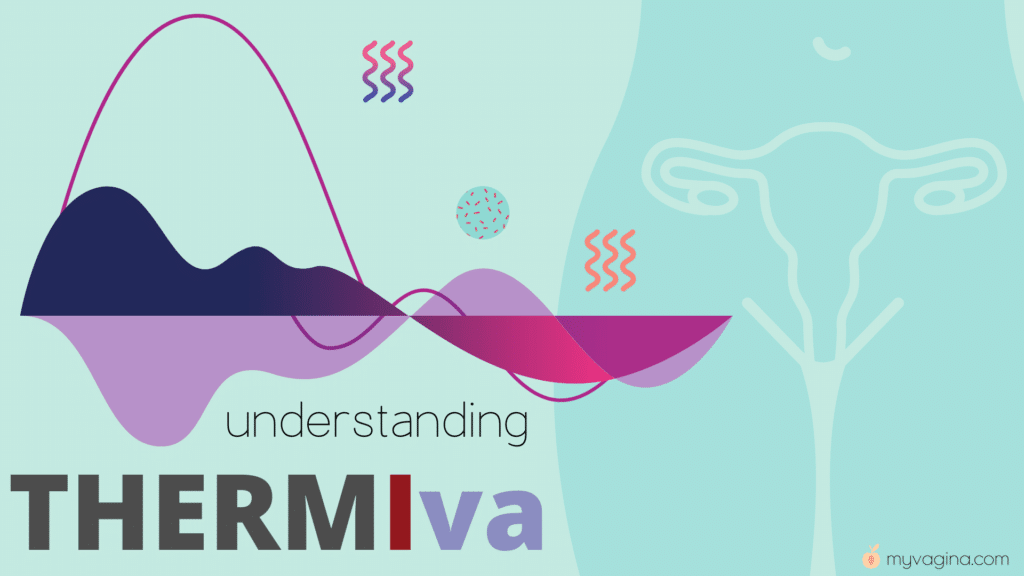The ThermiVa is a vaginal radiofrequency treatment device used to boost the performance of vaginal and urethral cells. The ThermiVa is not the only vulvovaginal radiofrequency device on the market, but it is well-known.
ThermiVa radiofrequency treatments can help with:
- Vaginal laxity/loose or rubbing feeling of vulva
- Unhappy with labia majora (external vaginal lips with hair on them)
- Sexual dysfunction, orgasm difficulties
- Problems keeping a tampon in
- Pelvic prolapse (fallen bladder or rectum)
- Stress urinary incontinence and urinary leakage
- Dry vagina or vulva due to menopause
Vulvovaginal radiofrequency treatments cannot help:
- Varicose veins
- Menstrual cycle
- Infections
What you need to know before ThermiVa treatment
- There are no age limits, but 18+ is the norm.
- You will be required to have a pelvic exam prior to ThermiVa treatment
- You can have an intrauterine device (IUD) present without issue (except in prolapse)
- It is recommended to have a recent pap smear, within the last two years
- Low-risk HPV subtypes are considered acceptable candidates, but high-risk HPV should be treated first
- You can be on hormone therapy, but apply vaginal oestrogens after treatment (not before)
- You do not need a uterus (hysterectomy)
- If you are undergoing chemotherapy, it’s best to wait until your treatment is finished
- You can’t have visible genital warts or herpes
- You must be pregnancy tested prior to treatment
- The treatment is considered very low risk with rare, minor complications and no major complications reported
- No anaesthetic is required and treatments do not hurt at all
If you are pregnant or breastfeeding
Radiofrequency treatments are safe during breastfeeding, with no effect found on breastmilk.
You can have radiofrequency treatments from six weeks after an ‘uneventful’ normal vaginal delivery.
Treating painful sex
If you have undiagnosed pelvic pain, please see your doctor for a diagnosis. The ThermiVa is not a cure for pelvic pain; this device is used for specific purposes and diagnosis is critical.
- Menopausal symptoms – dry, irritated vagina, stress urinary incontinence – ThermiVa excels
- Painful sex caused by pelvic mesh – talk to your pelvic surgeon first
- Introital pain from levator spasm, lichen sclerosus or hyperplastic dystrophy – can work well
- Vulvar lesions and precancerous or cancerous states of the vulva – no
Haemorrhoids, episiotomy, scar tissue
Radiofrequency treatments soften scar tissue since scars are made from collagen. Collagen, at the right temperature, ‘melts’ and can be remodelled. Tight scars can be softened so they become more comfortable, and in some cases look less prominent/raised/gnarly.
What to expect during ThermiVa treatments
ThermiVa radiofrequency treatments are quick – 10-15 minutes – and painless. The ThermiVa handpiece is used inside your vagina and around the vulva/perineum/anal area as required.
What to expect after ThermiVa treatment
You can expect some white discharge, and in some cases, spotting for up to 72 hours (from cervical cells, which are delicate).
References
Desai SA, Kroumpouzos G, Sadick N. Vaginal rejuvenation: From scalpel to wands. Int J Womens Dermatol. 2019;5(2):79‐84. Published 2019 Mar 7. doi:10.1016/j.ijwd.2019.02.003
Magon N, Alinsod R. ThermiVa: The Revolutionary Technology for Vulvovaginal Rejuvenation and Noninvasive Management of Female SUI. J Obstet Gynaecol India. 2016;66(4):300‐302. doi:10.1007/s13224-016-0868-0







